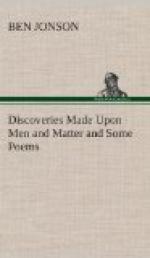Cato, the grammarian, a defender of Lucilius. {149a}
“Cato grammaticus, Latina syren,
Qui solus legit, et facit poetas.”
Quintilian of the same heresy, but rejected. {149b}
Horace, his judgment of Choerillus defended against Joseph Scaliger. {149c} And of Laberius against Julius. {149d}
But chiefly his opinion of Plautus {149e} vindicated against many that are offended, and say it is a hard censure upon the parent of all conceit and sharpness. And they wish it had not fallen from so great a master and censor in the art, whose bondmen knew better how to judge of Plautus than any that dare patronise the family of learning in this age; who could not be ignorant of the judgment of the times in which he lived, when poetry and the Latin language were at the height; especially being a man so conversant and inwardly familiar with the censures of great men that did discourse of these things daily amongst themselves. Again, a man so gracious and in high favour with the Emperor, as Augustus often called him his witty manling (for the littleness of his stature), and, if we may trust antiquity, had designed him for a secretary of estate, and invited him to the palace, which he modestly prayed off and refused.
Terence.—Menander. Horace did so highly esteem Terence’s comedies, as he ascribes the art in comedy to him alone among the Latins, and joins him with Menander.
Now, let us see what may be said for either, to defend Horace’s judgment to posterity and not wholly to condemn Plautus.
The parts of a comedy and tragedy.—The parts of a comedy are the same with a tragedy, and the end is partly the same, for they both delight and teach; the comics are called [Greek text], of the Greeks no less than the tragics.
Aristotle.—Plato.—Homer.—Nor is the moving of laughter always the end of comedy; that is rather a fowling for the people’s delight, or their fooling. For, as Aristotle says rightly, the moving of laughter is a fault in comedy, a kind of turpitude that depraves some part of a man’s nature without a disease. As a wry face without pain moves laughter, or a deformed vizard, or a rude clown dressed in a lady’s habit and using her actions; we dislike and scorn such representations which made the ancient philosophers ever think laughter unfitting in a wise man. And this induced Plato to esteem of Homer as a sacrilegious person, because he presented the gods sometimes laughing. As also it is divinely said of Aristotle, that to seen ridiculous is a part of dishonesty, and foolish.
The wit of the old comedy.—So that what either in the words or sense of an author, or in the language or actions of men, is awry or depraved does strangely stir mean affections, and provoke for the most part to laughter. And therefore it was clear that all insolent and obscene speeches, jests upon the best men, injuries to particular persons, perverse and sinister sayings (and the rather unexpected) in the old comedy did move laughter, especially where it did imitate any dishonesty, and scurrility came forth in the place of wit, which, who understands the nature and genius of laughter cannot but perfectly know.




